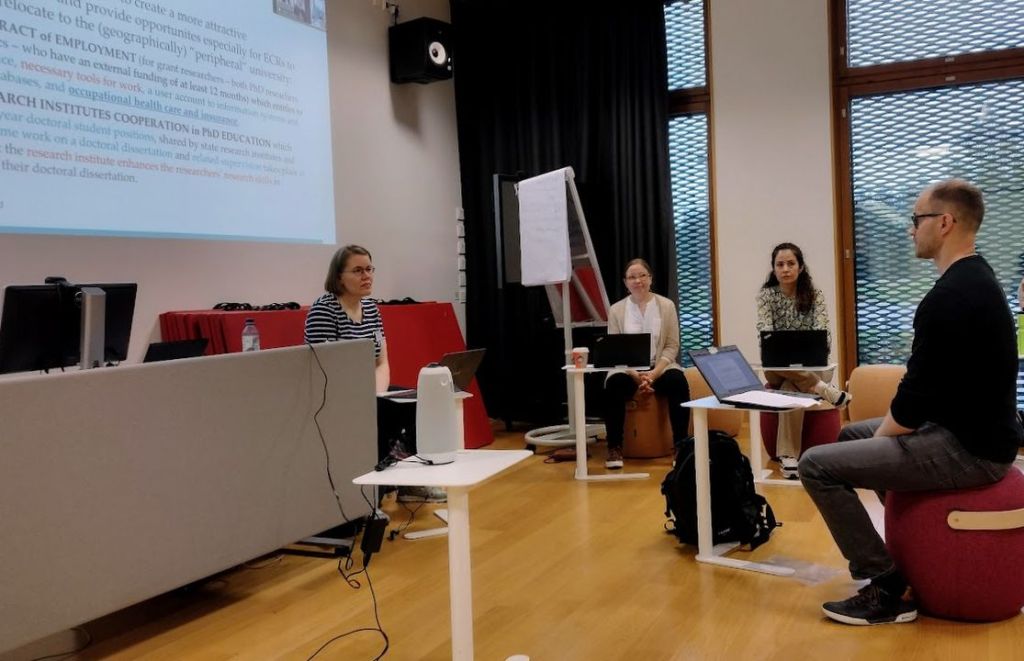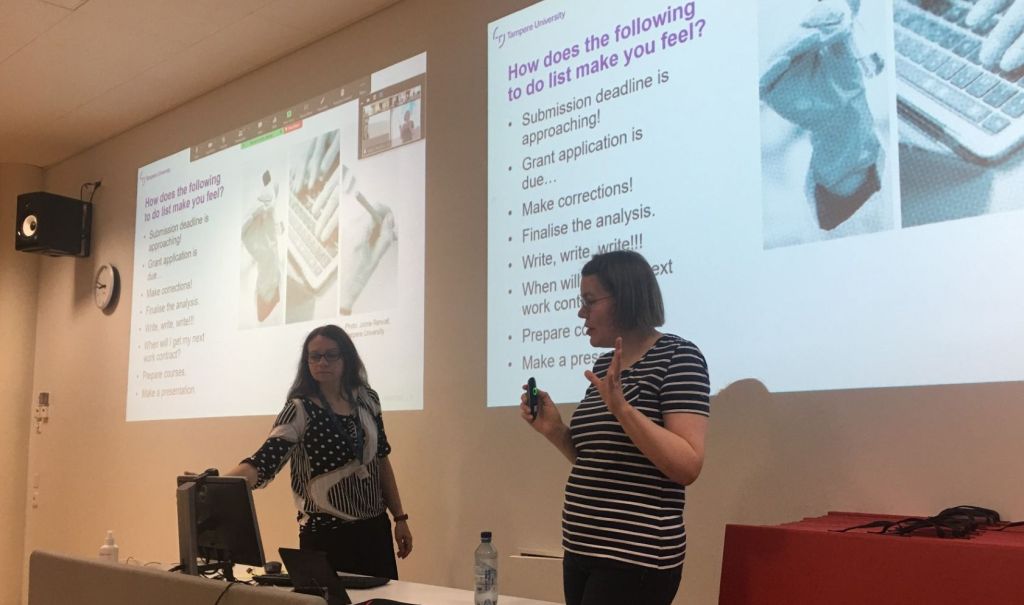
Anu Nuutinen (left), Henna Juusola, Golaleh Makrooni, Mikko Kohvakka and Vesna Holubek (not in the picture) organised a panel discussion about wellbeing of early career researchers in the Higher Education Symposium in Jyväskylä in 2023. Photo: Marc Perkins.
We, a group of early career researchers (ECRs) interested in higher education research, had an opportunity to organise a panel discussion about the wellbeing of early career researchers in the Higher Education Symposium in Jyväskylä (Finland) in August 2023. The panel discussion resulted from the interaction within the Network of Finland-based early-career higher education researchers. Wellbeing is a topic we feel passionate about, so we are delighted to share some takeaways from the event with you.
ECRs include doctoral researchers, recent PhD holders, and other academic staff with a PhD, who have not yet gained a senior or a tenured position in academia. Previous research has shown that wellbeing is a multi-faceted phenomenon. The various aspects of wellbeing are also pivotal in the context of academic careers and academic work. We decided to discuss the topic mainly from the institutional, academic community, and internationalization viewpoints. We focus on practical examples and experiences, from peers to peers.
Institutional aspects
The prevalent wellbeing discourse in academia may seem quite individualised. This inspired us to ask, what the responsibility of higher education institutions is in supporting ECRs’ wellbeing. Some universities in Finland are discussing or have already introduced practical solutions as a response to uncertain career prospects of ECRs.
Mikko, you opened the panel discussion by tackling some of the institutional paradoxes and tensions affecting wellbeing of ECRs. Could you give us some examples?
What I mean by paradoxes and tensions is that academic work is imbued with many contradictory yet interrelated elements that occur simultaneously and persist over time. They are appraised both as an opportunity and as a threat, in turn prompting positive or negative effects on ECRs’ wellbeing. Perhaps the most pivotal paradoxes and tensions people face are a long-term versus a short-term focus, a need for stability versus a demand for change, and self-control versus external supervision.
Mikko, you have some experience of how the University of Eastern Finland (UEF) has tried to address some of these tensions. Could you tell us more about the 10% employment contract for grant researchers?
What I find highly motivating is that the UEF took this significant step in June 2021 to improve the status of grant-funded researchers. Since then, all grant-funded researchers who have an external funding of at least twelve months have the opportunity to make a 10 percent part-time contract of employment with the university. This provides benefits for me and my fellow grant researchers, such as an office space, necessary tools for work, occupational health care, and insurance coverage. These benefits are normally associated with contractual employment and they make us a more integral part of the academic community. Overall, the reform has clearly increased a sense of stability and belonging in my working life.
Academic community aspects
Let’s move on and look at wellbeing from the community perspective. Henna and Vesna presented the results of a small survey focusing on the experiences of ECRs who are members of the Network of Finland-based early-career higher education researchers. This informal network was kicked off in midst of the COVID pandemic in 2021 and it operates through monthly online coffee meetings.
Henna and Vesna, could you share some views of the network members about the power of networking?
Based on the survey we sent to the network members in June 2023, as well as on our own experiences and the discussions during the online coffees, informal academic networking can clearly provide easily accessible social and professional support. It also serves as a forum for sharing reading and seminar tips, receiving support on how and where to apply for funding, and understanding what to consider when publishing articles, just to name a few examples. The symposium panel that the network organised and that inspired this blog is a good example of how this network enables connections with ECRs across different disciplines and universities in Finland. In addition to peer learning, we believe that an important aspect is the sense of belonging to a peer community and the academic friendliness that comes with it. These aspects are crucial for emotional wellbeing, especially for those who do not belong to any research group or primarily work remotely.
You also discussed the challenges in building informal networks. Henna and Vesna: How do you see the network’s future?
One challenge is clearly the question of continuity. While we believe that informality provides valuable flexibility, the existence of such a network depends on the time and effort of several people. And because we are not a formal organisation, there are some difficulties in having appropriate resources. For example, even applying for any kind of funding is difficult. Therefore, we think it is crucial that scientific communities recognise the value of these kinds of collaborative efforts, and that universities provide physical and online facilities to keep informal communities alive. We have received a lot of positive feedback from the members during the past two years, and there is a clear need and interest in maintaining the network gatherings. That is why we are hopeful that the network continues to operate in the future.
Internationalization aspects
Being an ECR with an international background may add yet another dimension to the way career progression and wellbeing are experienced. Vesna and Golaleh presented the views of international ECRs on wellbeing based on a recent study which was carried out by the Tampere University Association of Researchers and Teachers (TATTE) in collaboration with the Professors’ Union local chapter.
Vesna and Golaleh, what can we learn from the study about the perceptions of international early career researchers on wellbeing in the Finnish university context?
The study gives an overview of the diverse experiences of international researchers, teachers, and staff at Tampere universities. The study participants, mostly ECRs, described many challenges they encounter in their work and life in Finland. One of the major concerns mentioned was the prevalence of short-term work contracts in Finnish universities. Having short-term employment is especially stressful for people whose residence permits (and the permits of their family members) are issued according to the length of the contract. The participants also felt that they have limited opportunities to participate in the university community due to their limited Finnish language proficiency, but also because they are often perceived as being temporarily in Finland. Several participants described how they hit a so-called ceiling in their career because they could not – or were perceived as being unable to – participate in their university’s decision-making bodies (that were operating in Finnish). These aspects, precarious working conditions, feeling of not belonging, and uncertain career prospects, can cause a lot of stress and affect wellbeing at work, but also in personal life.
Golaleh, you also shared a personal experience about how language issues were tackled in a project collaboration. Could you tell us more about your experiences with the language barrier?
I had a unique opportunity to participate as a researcher in one project conducted mainly in Finnish. Despite my limited proficiency in Finnish, I was determined to make this opportunity work. I implemented strategies for effective communication in meetings and conversations. The team also started gradually to use both English and Finnish to enhance communication. This bilingual approach proved to be invaluable, especially when conveying crucial information. Additionally, working with another Finnish researcher was supportive linguistically and emotionally. Having a Finnish co-researcher and using bilingual communication empowers international researchers to utilize their potential effectively, preventing negative self-perceptions in Finnish academia. This approach does not only improve researchers’ language skills in Finnish, but it also aligns language acquisition with their professional interests and tasks. In summary, fostering a supportive and adaptable environment in the Finnish academia can enhance self-efficacy, a sense of belonging, and overall wellbeing for international ECRs to overcome language barriers.

Vesna Holubek (left) and Anu Nuutinen preparing the panel discussion. Photos: Golaleh Makrooni; Jonne Renvall, Tampere University (photo in the slideshow).
A way forward
We hope that the experiences and viewpoints shared in the blog resonate with you. Academic careers and work seem to be shadowed with several institutional paradoxes and tensions which impact the wellbeing of ECRs. Finding solutions to these challenges requires a holistic approach. We have, however, learned that there are encouraging institutional examples of concrete action to improve the circumstances of ECRs.
Despite many uncertainties and competitive pressures affecting ECRs, we have also witnessed peer kindness in academia. For example, being active in a network of fellow ECRs may strengthen the sense of belonging to the academic community and provide concrete advise which helps in navigating the everyday tasks of academic work.
Integrating in a culturally new community may present additional challenges, both to the ECRs entering Finland and to their Finnish colleagues. There are examples of good practices, but further action is needed in developing genuinely inclusive practices in the Finnish academia.
If you are interested to learn more, see for example the Researcher Mental Health and Wellbeing Manifesto. When concrete steps are taken systematically to the jointly agreed direction, the cumulative effect can result in substantial impact for improved wellbeing of ECRs.
ECRs behind the blog post
Anu Nuutinen (moderator of the interview-style blog post) is a part-time doctoral researcher affiliated with Tampere University.
Mikko Kohvakka is a postdoctoral grant researcher at the University of Eastern Finland.
Henna Juusola is a postdoctoral researcher at Tampere University.
Vesna Holubek is a doctoral researcher at Tampere University.
Golaleh Makrooni is a postdoctoral research fellow at Tampere University.